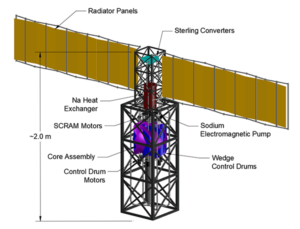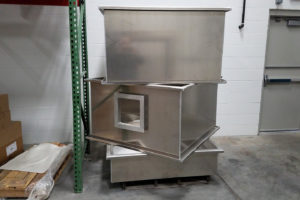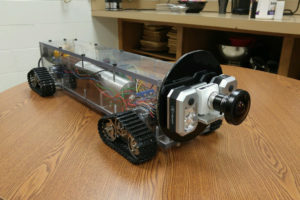We are very proud of the significant work performed by our undergraduates as a result of the Senior Design course. Here is a small sample of past projects.
» Axial Flux Mapping of a Subcritical Facility
Students: Garrett Robert, Henson Montgomery, John Charles Terosky IV
Faculty Mentor: Laurence Miller, Larry Sharpe
Sponsor: Electronic Power Research Institute
Description: This team’s task was to design and construct a robotic arm that accurately places a neutron detector into any location in the fueled region of the facility. The robotic arm will move with three degrees of freedom in the x, y, and z directions and will relocate under computer control. Three-dimensional mapping of the neutron flux in this facility, a 2016-17 project currently located in the Nuclear Engineering Building, will enhance educational and research opportunities.
» Rapid Autonomous Pneumatic Transport System
Students: Emily Hutchins, John Taylor, Xena McDonald, Jacob Melton, Elijah Davis, and Robert Bohn
Faculty Mentor: Wes Hines, Larry Sharpe
Sponsor: Electronic Power Research Institute
Description: This team’s task was to design an air-driven sample transport system that can deliver material samples into the fast neutron source core, transfer them to a detector for analysis, and then dispose of them, autonomously.
Find out which 2018-19 projects were recognized with a department award.
» PULSR
Students: Gavin Ridley, Dan Floyd, Walter Tebbs, and Patrick Tidwell
Faculty Mentor: T. Jay Harrison
Description: Students designed Plutonium Ultra-Light Space Reactor (PULSR) to produce power for extraterrestrial surface missions for up to 20 years. The project won second place in the American Nuclear Society Student Design Competition in 2018.
» Subcritical Facility
Description: The facility, a three-piece tank, is subcritical and useful for approach to critical and flux mapping experiments. It is currently assembled and resides in the Nuclear Engineering Building and is loaded with natural uranium. Other senior design projects are currently under way to use this facility.
» Pipe Crawler
Faculty Mentor: Graham Walford
Description: The purpose of the project was to move independently through relatively large pipes in contaminated piles and map the radioactivity, primarily uranium, in the pipe. This would eliminate, or significantly diminish, the need for external radiation measurements that may be too high to directly measure. Uranium-235 emits low energy photos that are highly attenuated by the pipe, which make external measurements time consuming and inaccurate.


